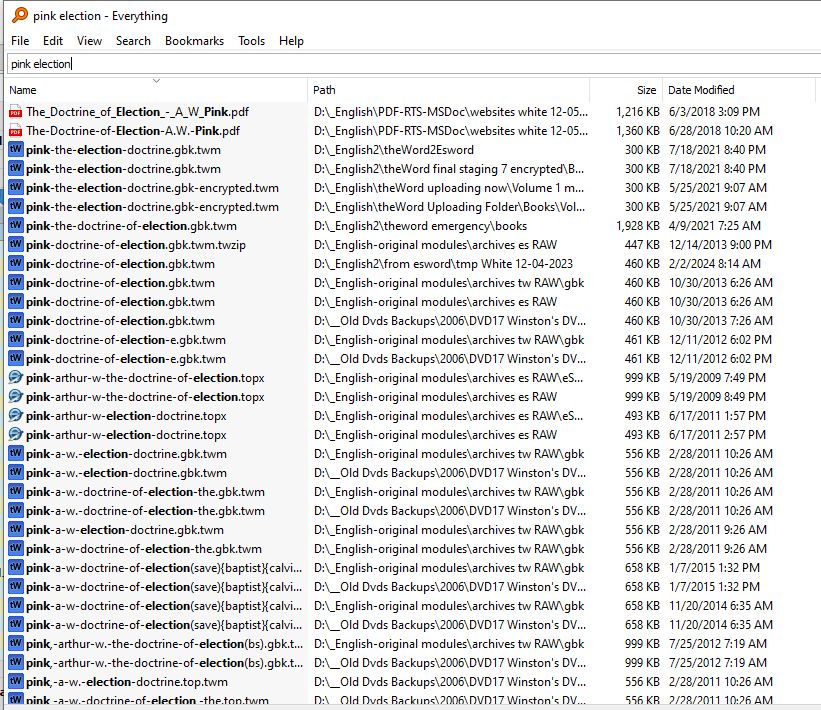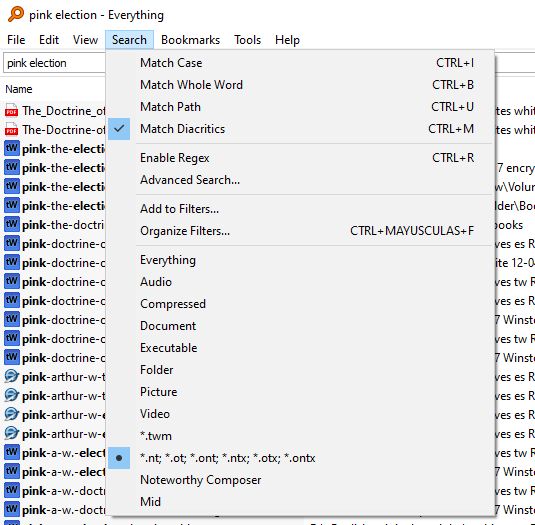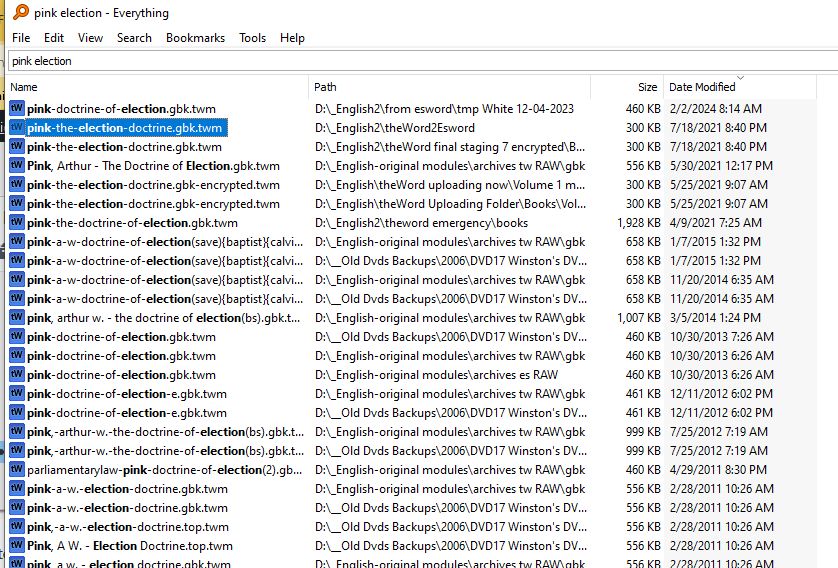Some Professional Advice
I have been a user of theWord for some years now. My use is both in English and Spanish, both for studying and researching material (tw modules) for my sermons and my own writings (which for the most part are in Spanish). So I am not only a theWord user, but a theWord user in multiple languages. Some of my one-page tracts I have in Portuguese, Italian, French, Chinese, etc. In order to translate to these languages, I have about 8 theWord USB installations in their own folders (each folder/USB theWord installation has a Bible in that language and a language file), but the English is installed into Windows. The rest run under their own folders as if the folder was on a USB.
As I am once again going through my archives and my laptop gathering theWord modules, I am working with about 40,000 theWord modules. I go through that, deleting duplicates, and choosing the last version (file date based) of each module without opening up that module, actually.
In working with files within Windows, I would wholeheartedly recommend the free utility program called Total Commander (https://www.ghisler.com/), which I wrote about on my personal blog here. The ability to copy a batch of files from one folder to another is marvelous. Yes, you can do this in Windows file explorer, but I like the feature of replacing older files option of Total Commander. It will not overwrite a newer file.
My advice here is not that, but rather that you need to earnestly evaluate what you are doing in the use of theWord. Today, the problem of doctrinal error, is not the only thing a Bible student, preacher, or Pastor has to look out for. Today, the issue Satan throws at us is information overload. In other words, it is not just good stuff versus bad stuff, but just too much stuff to really use anything usefully. When we talk about theWord, finding them and downloading them, this is a very acute problem.
Just from this present site, not considering that you probably could download hundreds of more files from other sites, but just from my website, we offer probably close to 3,000 theWord modules. With this present version of the website that I am working on, I am trying to get my module set down to under 5,000 modules. What is on my work folder on my laptop is 30,000 modules.
theWord is robust but not superman
theWord works like a charm. I once got a hold of a 286 laptop, with a whopping big 20 megabyte hard disk. At that time, I think my laptop had something like 300 gigabytes of hard disk. So I did see much use of the laptop that I was given. But I did install theWord on a USB (16 gigabyte USB) with a bunch of modules, and just see if it would run. Worked great.
But theWord is like any computer program. It has its limitations. So the point I want to make is that you need to understand the point when a tool breaks, and do not push things beyond “that point.” So theWord will “break” at some point on a start where there are too many modules. I have don’t this, and frequently forget or not check, and start a USB theWord folder with a couple of 1000 modules in the folder and subfolders.
Every time theWord starts, it checks and indexes all of its reference modules, i.e. Bibles, commentaries, dictionaries, books, Bible reading plans, maps, etc. This takes time. If you have 500 modules, that is not bad. It is not bad if you always start and run the program from the same place, i.e. folder, or from the Windows install version of theWord.
But if you dump 1000 theWord modules into a theWord folder on your computer, leave your computer, go to McDonalds and buy yourself lunch and come back in about 2 hours. It will be ready. This is not theWord’s fault, it can only index files as fast as your computer is. But some theWord users will try to do this anyway. Trust me, don’t try it more than once to see that I am right.
You need to download your theWord modules slowly over time, and open what you get and scan briefly each module, and either decide to keep it or remove it from your theWord folders that are scanned at each start up. Even though theWord will work with say 2000 modules, it is still cumbersome to make a module set list to use those files. Basically, it is not worth all the effort you will have to spend to do that.
Make a couple of folders and download theWord installation files and install it as a USB version. Do it once, copy your favorite Bible and modules, like Treasury of Scripture Knowledge and Strong’s Dictionary and make 5 or so copies of the entire folder. In that startup, theWord will basically only read the modules in the folder it is installed in and any folder UNDER that main folder. It will also pick all modules that are in the Windows c:\Users\david\AppData\Roaming\The Word\ folder, so you can copy your kjv.ont and strong.dct.twm to that folder and they will appear in all these USB folder installs. See How to install tw in Compact Mode USB Mode.
From there, rename your folders to whatever. For example, I am writing a commentary on James in Spanish, so I named one folder, theWord Santiago (James). I copy what theWord modules I want as reference into that folder, (a subfolder called “Books”). I make another folder called PDF and copy both English and Spanish commentaries in PDF format there. From that, I work out of that folder and theWord loads quickly, and I have everything I need just about. Sometimes I know that there is some theWord module on James, and it is in another folder, not there.
I use a second utility program called, “Everything” (https://www.voidtools.com/). Everything is also a gem that I picked up along life’s way. It is a utility program, and beats Windows search completely (also the Total Commander search utility.) It copies your hard drives’ file systems into its memory, and it is almost instantaneous in its searches. By default, it searches everything except removable storage. (Maybe it does that also, but I haven’t been motivated enough to study it).
But if you know a file is on your computer, but you don’t know where exactly, in about 3-5 seconds that it takes to scan your entire computer file system, you will know where it is. As an example, I know that there is a file by Arhtur Pink on my computer on election.

Here you get what you need to know, actual particular name, path, size, date.
Moreover, on the menu bar of Everything, there is a search filter option.

Click on “Add filters”, and add the theWord extensions for its files, and you will only see theWord files on your entire computer.

So in the image above, you will only see the filtered results (*.twm filter) and order by date (click on “Date” title of the column). If I have more than one file with that search filter, I can go to the most recent one. This is also excellent for searching for sermons or Bible studies, and you can see what you have and where it is, along with the date. Total Commander does the same thing, but it is very slow except on a folder, where I like using that first if I can limit the search to just a single folder and its subfolders.
But I highly recommend the theWord USB install in particular study folders as well as installing theWord in your Windows. You really need both. But with more than a few hundred modules, you need help separating and working with different groups of modules. Within theWord, there is the Module Layout setup function, which functions somewhat similarly. (Read my tutorial Working with Module Sets, Specialized Module Sets and theWord Layout Sets) But my main point in all of this is to be careful with just downloading everything you see that is a theWord module. If you do that, buy an external hard drive and what you don’t really want to use right now, store it off of your computer.